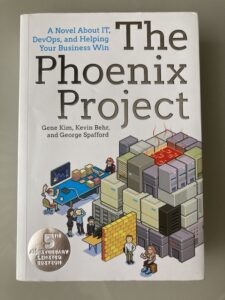Several months ago, I finished reading “The Phoenix Project” by Gene Kim, George Spafford, and Kevin Behr. The book tell the story of an IT operation engineer, Bill Palmer, who get a sudden promotion and have to deal with all sorts of complications and difficulties while being under immense stress during a pivotal moment in the life of Parts Unlimited, a large industrial company he has been working for for many years, and that has been struggling to keep up with competition in last few years.
Chapter 2
Although I barely started reading Chapter 2, I was already having all the anxieties that Bill Palmer is having while thinking about all the issues that keep arising relentlessly. Despite all the good effort on his side, he is blamed for years of failures and mismanagement and meeting deadlines of commitments that predates his appointment to the post. While reading through the early chapters I was hoping that he will do well. He didn’t put himself in that spot but there is no other way. However, I know that this book is about the positive change DevOps practices can bring, so I already knew how the book will end, and I was still interested in the transformation.
The dramatic twists are unconvincing, but that’s not why the reader is reading the book I assume. It is a book about lean management.
The reader is invited at turning point to hypothesise about the best management decision to take, or how some “lean principles” or learning should be translated or implemented in the IT world. The experienced reader would get it right or wrong. In both cases the reader passively learn a thing or two without much effort.

Reading the tea leaves
The amount of disfunction at the company and that the protagonist has to deal with is overwhelming to say the least. I am sure that there are many large successful organisations that were not agile enough to understand that the developments in IT are not just mere improvements to the work-process, but rather a revolution in the way companies and organisations can operate.
If an organisation does not manage to harness the potential of the IT revolution, they will be overrun by the competition. In my humble opinion, I believe this principle could also be generalised to competition among nations.
Retrospect
In retrospect, I think I was lucky for or two reasons…
The first reason is that I have already read “The DevOps handbook” by Gene Kim, Jez Humble, Patrick Debois, and John Willis, and took it to heart. The book is a great manual for managers working in the IT field or managers of businesses that are heavily depending on IT. It helped me put the lessons I learned during many years of experience in a well structured framework (the Theory of Constraints). After reading that book, not only I know when my intuition was right but I also know why. It also fixed some false assumptions and intuitions especially where I did not have practical experience, or a practical experience that was negative. Since then, I have been gradually implementing many of the concepts described in the handbook systematically in companies I work(ed) for or with, with amazing results. Despite that, the novel helped me understood better points I thought I have understood enough from the Handbook.
Having read the Handbook first, reading The Phoenix Project felt in part like a study case of DevOps transformation in action, and in part felt like an DevOps knowledge test, especially when a problem has been identified at Parts Unlimited and when Bill is contemplating a solution, until Eric reviles the answer.
The second reason is that I had the luck of purchasing a later edition (the 5th) of the book, and that contained a “look back” section discussing the wide reception of the book, its success and how people working in the field started associating with Bill, John, Wes, Steve, Patty, or other characters from the Novel. Feelings I had while reading The DevOps Handbook first, and again with The Phoenix Project. As mentioned in the “look back” section, like many other peers, I am using both books as well as terminology from the books to identify other “Phoenixes”. In short I highly recommend it as well as the Handbook.
Conclusion
In short. I highly recommend “The Phoenix Project” as well as “The DevOps Handbook”. They are both very valuable and are part of the DevOps transformation that is still taking place in the IT business. It is also inspiring managers to take the lean principles to businesses and sectors where those principles have not been introduced or implemented yet.
Outlook
My goal now is to understand how does the lean management principles and the theory of constraints applies to NGOs and NGOs management. From what I know, I am sure there is a strong case for introducing the principles of flow to NGO world, although my intuition is that has already been done…
Credits: The featured image was generated by DALL-E-2.
